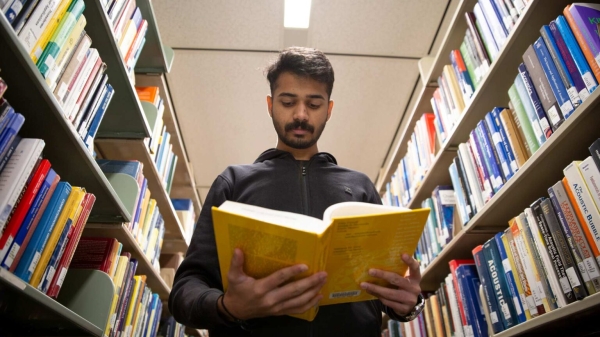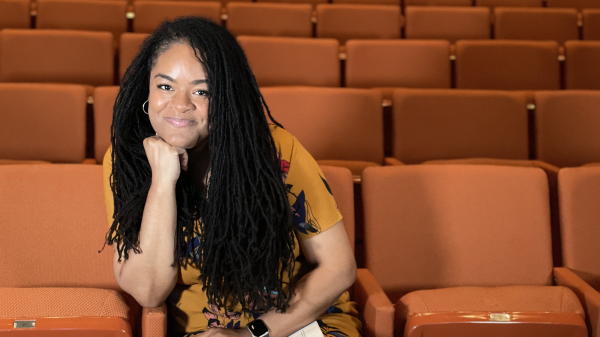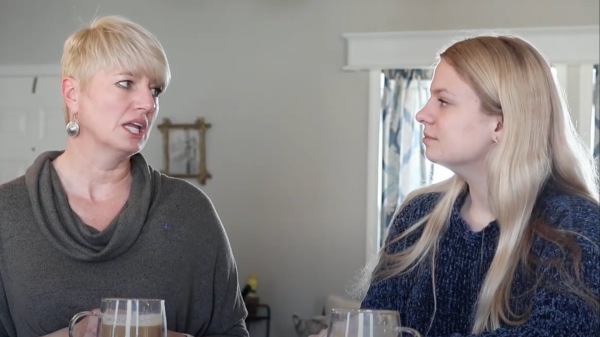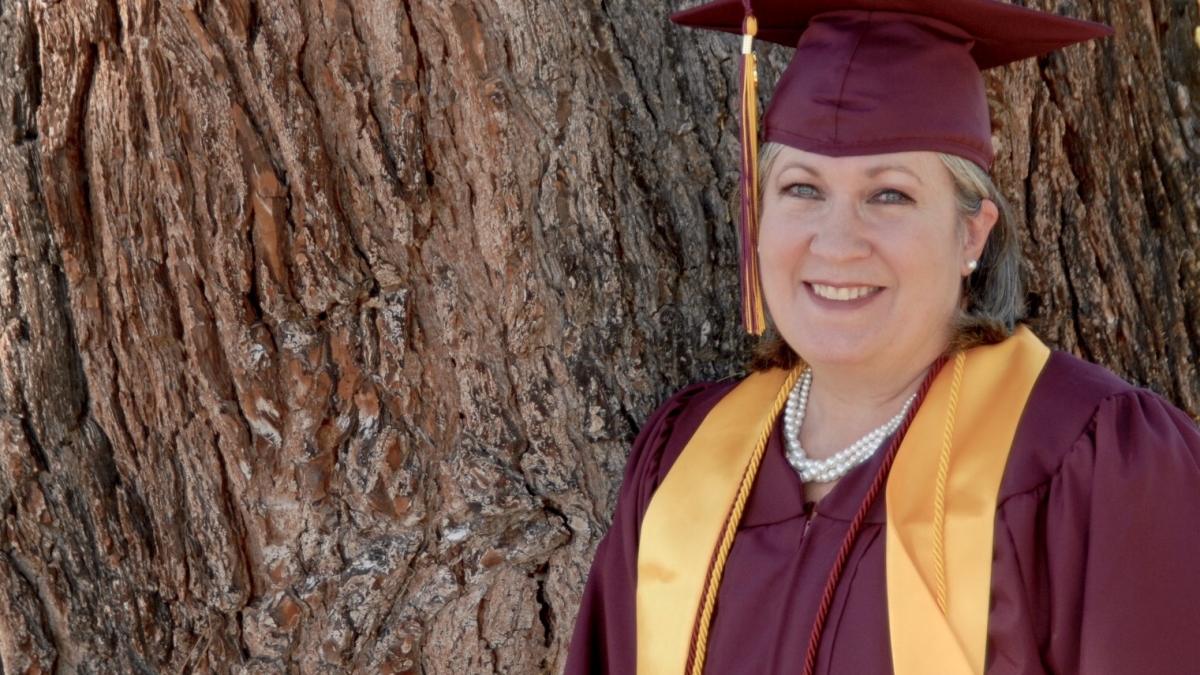Editor’s note: This is part of a series of profiles for spring 2017 commencement. See more graduates here.
Nearly 60 years old, Cindi Tanner isn’t your typical student at Arizona State University.
Baking cookies for her classmates, sitting in the front row for every class and craving knowledge, information and resources were cornerstones of her educational emergence.
“My story is a little bit different because I’m older,” said Tanner, a transfer student from GateWay Community College. “I had to work so much harder to be competitive with the young students, but I never felt unwelcome anywhere on this beautiful campus.”
Tanner is graduating with concurrent bachelor’s degrees in anthropology and sociology from the College of Liberal Arts and Sciences. This milestone accomplishment for Tanner has immense value because she’s always emphasized the inspiration of education, literature, music and arts to her five children.
“I have my cap and gown hanging in my bedroom where I can look at it every day, and it’s kind of unbelievable,” Tanner said. “I never thought I could perform at this level. After being subjected to a dangerous domestic violence environment my entire adult life, it was astounding to me that I could compete with such young, bright people. My hunger for my formal education in part was an effort to catch up for all those years I had to focus on survival.”
Tanner’s passion for human societies and cultures surfaced when she was 17, but she didn’t know it had a name until later as she raised her children and collected books on cultural anthropology. After nearly 35 years of marriage, Tanner escaped intimate partner violence and stepped “into the void” of her new life. She said it was terrifying, but a class schedule and backpack full of textbooks filled her with joy and hope.
“When I was younger, I was told I could be a mommy, a secretary, a nurse or a teacher – and that’s truly the way it was. Now, it’s limitless and women have more opportunities than ever,” Tanner said. “There’s no guarantee that I’m going to get a better paying job because I’m already at the threshold of senior citizenship; but I absolutely have the chance to pursue what I adore.”
Indulging in her quest for more knowledge and validation, Tanner personally invested herself into her life-long dream of a university degree. Fatigue, on-going family crises, financial instability and self-doubt were dominating challenges filled with uncertainty. Launching a new module in Pre-Colonial Mesoamerica, reading an ethnographic clinical study or exploring the social structures of ancient and modern societies, however, delivered a very predictable reward: Tanner couldn’t get enough.
“Being older has some inevitable drawbacks,” Tanner said. “As a non-traditional student, I can’t remember things the way I used to when I was younger. On weekends, I do nothing but school work. My time investment as a student is super precious.”
Although Tanner was an empty nester while at ASU, she used her skills from being a mother of five to tackle her schoolwork. She said she was the queen of organization and time management, which were essential to her success as an undergraduate.
“Sometimes a student comes into my course and really brings me joy. I’ve had Cindi Tanner in two such courses,” said Kathy Thomas, instructor in the College of Integrative Sciences and Arts. “She has incredible dedication to her work and is focused on academic excellence. She’s always striving for a better understanding. It’s been a pleasure to work with her. She’s an amazing woman.”
The biggest shock Tanner encountered as a non-traditional student was the online format for exams.
“I’m a different generation. I remember when we had rotary phones. I remember watching the moon landing. And, I remember when President John F. Kennedy was shot,” Tanner said. “I had no idea that I’d have to take complex exams in the digital format with a little clock ticking down.”
While the online exams weren’t her favorite aspect of the modern college experience, Tanner did enjoy classes where writing was very intensive – both in online discussions and academic papers.
“That was pure gold to me because I finally had an outlet to apply critical thinking and express my thoughts,” Tanner said. “There’s a point where trauma kind of dictates who you are, and it’s very difficult to escape that faulty definition. My experience has given me a powerful voice that you don’t hear often from people who have survived what I have. So, I really thrived on the opportunity to be heard, especially when instructors were willing to share constructive feedback!”
Tanner hopes her story will help start a national dialogue about the interrelatedness of addictions, domestic violence, and emotional/mental disorders because it’s a social health crisis, she said.
“After hearing my story, the number of women who’ve disclosed to me they’ve been assaulted or know someone who’s currently in a dangerous relationship is astonishing. And, the lifelong injury and damage inflicted by it is ubiquitous,” Tanner said. “This social dilemma thrives in silence, particularly within faith communities. The more we’re unwilling to confront addictions and abuse as a pathology with a high rate of generational transference, the more powerful it is. The only way to expose perpetration and demand accountability is transparency.”
Tanner said she is profoundly grateful for the ASU community, which supported her every step of the way on her reinvention journey.
“My fear of being ostracized or marginalized as the granny didn’t materialize,” she said. “I appreciate the supportive instructors who were sensitive to my social demographics. I appreciate my young, beautiful classmates who were kind to me and didn’t speak to me in a belittling way. I was always treated with respect. Honestly, I had a little tear in my eye every time I walked on campus.”
After graduation, Tanner plans to continue with a hybrid master’s and doctorate degree program in anthropology (complex adaptive systems science). She also hopes to fulfill the American dream of buying a home and planting a tree.
“Don’t take this moment for granted,” she said. “I know my life story is not totally unique because we’ve all come from some kind of obstacle or barrier, but what is unique is what we’re willing to do with it. Almost anyone can probably pass a class, but what’s our destiny? What’s our motivation? What’s our hunger to show what we can do with our education afterwards when no one is grading our performance? That’s the real test.”
More Arts, humanities and education

Engineering knowledge: Recommended reading from Fulton Schools faculty, staff
In this 13th edition of the annual Essential Reading feature, 10 more faculty and staff members in the Ira A. Fulton Schools of Engineering at Arizona State University join in carrying on the…

ASU Gammage Scholar and MFA student forges path to her future
Editor’s note: This story is part of a series of profiles of notable spring 2024 graduates. Theater was an escape and an outlet for Crestcencia Ortiz-Barnett as a young girl in Detroit. “I learned…

Data science student investigates Arizona education system, reform through Steve Jobs Archive fellowship
Arizona State University student Brinlee Kidd was one of nine people across the U.S. chosen for the inaugural Steve Jobs Archive (SJA) Fellowship, launched last year with the goal of allowing young…
